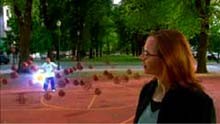|
A strange new documentary asks 'What the Bleep Do We Know?' It's hard to respect a film from the get-go that substitutes the word "bleep" in the title for what must be the most popular four-letter expletive in use today. As I've mentioned before, nowadays the word fuck has as little to do with its original meaning as the once-festive adjective gay. And if the producers of the new film/ideology What the Bleep Do We Know? are correct, nothing in the universe is fixed anyway, not the ground under your feet, not your bad luck with men, and certainly not the word fuck. It just seems a rather wimpy step for people who boldly posit themselves as revolutionaries on the scale of Copernicus, Galileo, and Einstein to take.
But let's not get hung up on details. What the Bleep is a big big picture film that invites you to reimagine the world with yourself at the center as the primary creative force in your life. "There is no 'out there' out there," says one of the several talking heads who narrate the film while Marlee Matlin (so compelling in Children of a Lesser God, so After School Special here) walks through a dramatization of how your life could change if you, too, believe that quantum mechanics can finally answer the great philosophical questions that dog mankind (but don't dog dogs, which is why they make such indispensable companions). One man tells us that traditional physics can't account for our belief in the ability to know, but not alter, the past, and to affect, but not know, the future. Another says that we now know that the smallest components of matter - long thought to be a constant in the universe - pop in and out of existence. A particle, for instance, "is more like a concentrated thought," and the myriad particles of life are, like Schröedinger's famous cat, in a state of eternal possibility until we focus on them, at which point the potential realities collapse into one, delimited by our expectations of what is possible. It's heady stuff, edited together in piecemeal narrative (the filmmakers may believe in a new thought paradigm, but they stick closely to the contemporary documentary paradigm). So who the hell are these people? you might ask. One of the film's weaknesses, if you're a Doubting Thomas type, is that the "experts" include notable scientists, medical doctors, psychiatrists, and "spiritual teachers, mystics, and scholars," none of them identified on screen (at least not in the screener), implying that they're all equally credible. But when one gentleman claims that experiments in which visual stimuli and recalled stimuli "light up the same areas of the brain," can only mean that the brain "doesn't know the difference" between "reality" and memory, you'll forgive me if I'd like some back-up. That sounds like one possible interpretation, another being that the brain is capable of pitch-perfect reconstruction of reality.
In the wake of this presidential election, I am as eager as the next agnostic or atheist for a non-theological belief system that emphasizes personal responsibility for the present, but What the Bleep feels more than a little like a recruitment film for a new branch of Scientology - not least because the promo packet claims that "Cultural Creatives" will be drawn to these ideas and provides a survey so you can tell if you're a "Cultural Creative." ("Have your finances under control, and are not concerned about overspending," reads one particularly flummoxing criteria). This shaky marriage of philosophy, spirituality, and science feels awkward, like hearing that Buddhist monks love Hollywood celebrities, so for the time being we may have to follow the sage advice offered in the opening sequences: "The real trick to life is not to be in the know, but to be in the mystery." • By Elaine Wolff
| |





